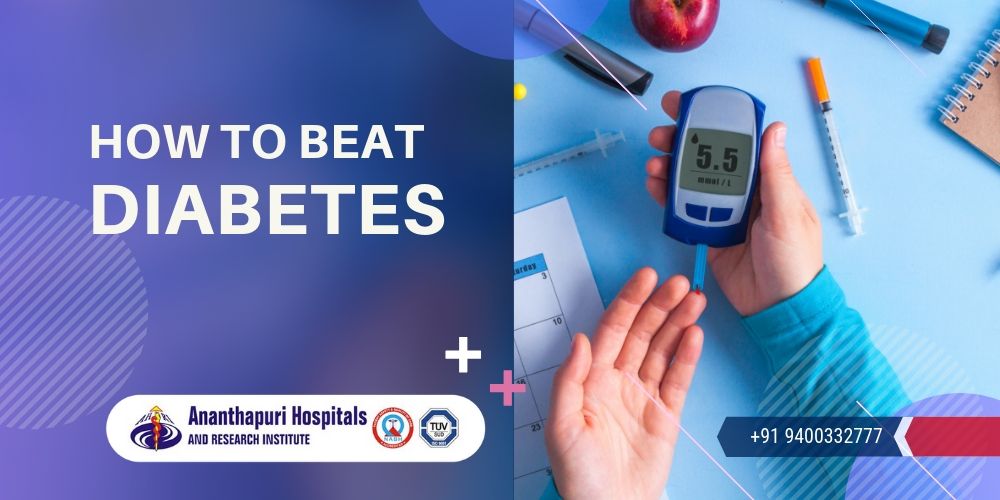- 09/July/2019

Diabetes and Its Symptoms - Ananthapuri Hospitals, Trivandrum
Millions of people around the world are affected by diabetes!
Diabetes (Diabetes mellitus) is a chronic condition characterised by poor regulation of blood sugar causing it to accumulate in the bloodstream. It increases the risk of other chronic diseases such as hypertension, vascular disease, and causes life-threatening complications such as stroke, diabetic foot ulcers, and peripheral vascular diseases. This is why it remains crucial to know what steps to take to prevent and manage the disease.
What are the symptoms of diabetes?
Many a patient with diabetes have no symptoms at all.
If you have diabetes, you may experience:
- Increased thirst
- Excessive urination
- Hunger and frequent eating
- Fatigue
- Unexplained weight loss
- Poor wound healing
Am I at risk of diabetes?
There are two types of diabetes: type 1 and type 2. The risk factors of diabetes vary slightly, depending on the type of diabetes you have. Identifying the risk factors of diabetes help in managing the disease. Take a look at the risk factors of type 1 and type 2 diabetes!
Risk Factors for Type 1 Diabetes
- Autoimmunity: In autoimmune disease, the cells of the immune system - which are meant to attack and eliminate harmful pathogens - turn on normal healthy tissue. If you have been tested to have the diabetes autoantibodies, you have a high risk of developing the disease.
- Family History: Possibly because of the genetic predisposition to autoimmunity, a family history of type 1 diabetes makes you more likely to develop the disease.
- Environmental Factors: Environmental factors such as viral infections and use of certain medications which damage the pancreas
Risk Factors for Type 2 Diabetes
- Obesity: The more fatty tissue deposits in your body, the more resistant your cells will become to insulin. Common causes of obesity may include genetic predisposition, physical inactivity, and unhealthy dietary habits. According to the Center for Disease Control and Prevention (CDC), 87.5 per cent of adults with diabetes are either obese or overweight.
- Age: The older you get, especially after the age of 45 years, the more likely you are to develop diabetes, especially type 2 diabetes. This is because of the high tendency for physical inactivity, loss of muscle mass, and weight gain which may occur as one ages.
- Family history: If a first-degree family relative (parent or sibling) has type 2 diabetes, you have a high risk of developing it.
- History of gestational diabetes: If you developed diabetes during pregnancy, you have a high risk of having prediabetes and full-blown type 2 diabetes after pregnancy.
- Hormonal Problems: Hormonal problems such as Cushing’s syndrome and polycystic ovary increase your risk of developing diabetes.
- High Blood Pressure: Blood pressure levels consistently over 140/90 millimetres of mercury (mmHg) increase your risk of developing diabetes.
How do I prevent or control diabetes?
Having understood the symptoms, risk factors, and the complications of diabetes, it is essential to know what preventive measures you can take to lower your risk of developing the condition and to improve the condition if you have been diagnosed with it.
Preventive Measures for Diabetes
- Eat Healthy Foods: Your doctor or nutritionist may provide you with a list of fibre rich foods you should eat more of and those you should avoid. More importantly, your doctor will help you create a diet plan which includes a variety of foods so you do not develop nutritional deficiencies while trying to control diabetes.
- Lose Weight: If you are overweight, losing 7 per cent of your body weight reduces your risk of diabetes by about 60 percent. You can achieve healthy loss by maintaining a low-carb diet, avoiding foods high in trans fats, and exercising.
- Get more physically active: Aim for a minimum of 30 minutes of moderate activity - such as brisk walking, bicycle riding, or swim laps every day. You can break into short sessions done throughout the day.
How is diabetes treated?
Treatment for diabetes involves the use of medicines that lower blood sugar. While using these medications, you will need to constantly monitor your blood sugar levels by taking some tests such as fasting or random blood glucose test and haemoglobin AIC tests. These tests are done to assess your blood sugar control over time and help your doctor change modify your treatment.
-----------------
After being diagnosed with diabetes or if you have been diagnosed for prediabetes, it is essential to take preventive measures seriously to get your body to handle sugar better. If your blood sugar continues to accumulate uncontrollably, it may affect several organs and cause severe damage. Your doctor will also instruct you on proper footwear and foot hygiene to prevent injuries and diabetic foot.
Department of Endocrinology & Diabetes of Ananthapuri Hospitals provides comprehensive and structured health care programs to our patients, which include comprehensive diabetes care and endocrine disorders. To book an appointment, call us at +91 9400332777 or visit our hospital at Chacka, NH Bypass, Thiruvananthapuram.
- tags
- diabetes

